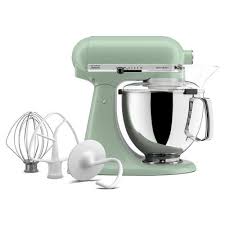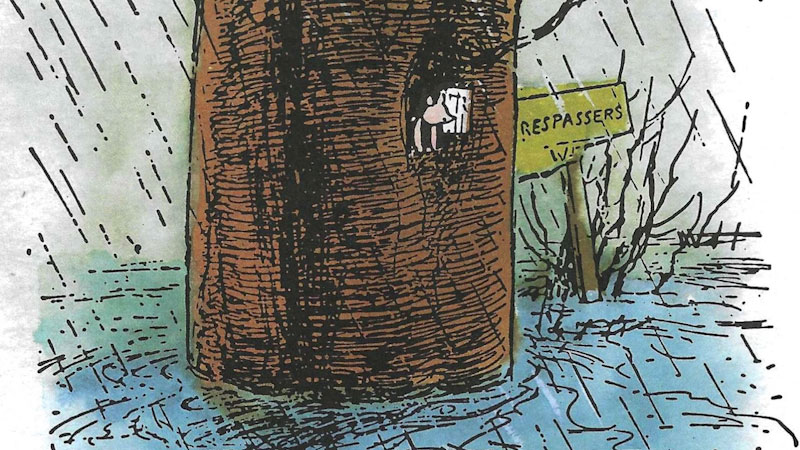The good news is that the newsletter today has no references to the life-lessons bestowed on those of us unfortunate enough to be obsessed with running. The bad news is that there is a home appliance repair metaphor.
Our good old reliable Artisan Series 5-quart Tilt-Head Stand Mixer, repository of many splendid family memories and witness to the flour-everywhere joy of making cookies with six-year-olds, is on the blink. Being fresh out of six-year-olds, I took our ancient mixer down the street to our neighbor who—if the slogan on his hat is to be believed—“knows stuff and can fix anything.”
Mike plugged in the mixer and turned it on. He listened to the sound—a cross between a microwave being married to an unhappy tuba while going down a garbage disposal—for under one full second before describing exactly what was wrong with the device, how long it would take to fix it, and the cost of said repair. One second.
I was impressed with the depth of his knowledge and, although I don’t remember his exact words—something about a combobulator or possibly a framistan—I was pleased that he was on the team.
His expertise got me thinking about parenting. I know, I know. A sparrow fluttering a wing in the next county makes me think about parenting. I reflected on how great it would be if loving parents could perceive just exactly what is going on with our beloved children as quickly, just from listening to them for a fraction of a minute.
Kids are trying to tell you what’s wrong, what they need, what they’re thinking about, what’s important to them. It’s critical to 1) take our kids at their word and 2) listen just as hard as we can. Because if we get it wrong often enough, they will stop trying to tell us what going on in their expanding noggins. And then we are in worse trouble than the shepherd in the fable.
When little ones ask for “one more story” and don’t want to go to bed alone, they are not manipulating you. They aren’t jealous that you want to spend a few minutes alone with their other parent. They aren’t setting you up for a lifetime of dependency and rescuing them as they grow up to be feckless, needy adults with life threatening substance use disorder.
There is nothing to be gained by treating little ones as mini-adults who need to “suck it up” and “deal with it at bed time.” A little tenderness will be more effective than any WWII movie cliches.
When your six-year-old wants to hear Chapter Nine of Winnie the Pooh for the third time that evening and the gazillionth rendition since last Thursday, it’s because they are genuinely scared and would prefer not to miss what else might be going on in grown up world in the other room where the lights are on.
When your ninth grader says they’re having trouble in math, they’re not communicating that they’re looking forward to ending up like your uncle Vincenzo who also did poorly in algebra and was soon working as a mechanic’s assistant after impregnating two of the neighbors. Your 14-year-old is actually having a hard time with the quadratic formula. Mortgage the farm.
Your kids are typically doing the best they can. Nobody wants to be scared. Nobody wants to not understand math. Nobody wakes up in the morning and thinks, “I know, I’ll pretend to have learning differences or mild mental health issues or problems paying attention.” Anyone who has the motivation and the ability to learn how to solve math problems will solve math problems. That scene in Mean Girls when Lindsay Lohan pretends not to understand calculus so that the cute boy will spend time explaining it to her? Your daughter is not Lindsay Lohan.
In all my years as a math teacher, counselor, and parenting expert, I never once met a student who enjoyed “negative attention” from acting out or invented issues that prevented them from achieving in the classroom. “I could just answer this problem correctly or, alternatively, I could begin an endless series of conferences and conversations” said no child ever.
Our job as loving parents is to figure out what the issues are. If only kids were as easy to listen to, diagnose and help as a wonky five-quart blender.







2 thoughts on “Broken Blender”
What a beautifully written reminder—thank you.
As someone who’s spent a career helping brands figure out how to truly listen to their customers, I’m struck by how perfectly you captured what it means to really listen to the people who matter most: our kids. It’s not about diagnosing quickly, like your neighbor with the uncanny ear for malfunctioning mixers—it’s about being present, open, and patient enough to hear what’s actually being said.
Your line about kids doing the best they can? Gold. And one every adult—parent, teacher, or boss—should keep close.
Thanks for the heartfelt metaphor and for mixing just the right amount of humor and wisdom. I’m a better listener today because of it.
Honored and humbled by your kind words, Old Friend. Glad we’re on the same team.
Wouldn’t you agree that in these grumpy times, listening is becoming an art that is as much lost as needed. I know that the clients who have had the benefit of your insight and guidance over the years would assent.